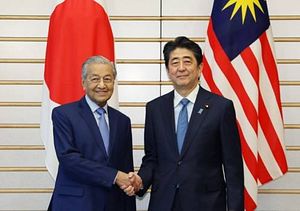Malaysian Prime Minister Mahathir Mohamad traveled to Japan last week for his first overseas trip since his stunning victory in the general election on May 9. Mahathir’s decision to prioritize the three-day working visit is seen as a positive gesture toward Japan at a time when China’s influence across the region has been growing.
During the trip, Mahathir signaled his determination to reduce Malaysia’s indebtedness to China. He requested yen-denominated soft loans in a bid to reduce debt servicing costs, made a pitch to Japanese investors, and pledged to strengthen Malaysia’s overall relationship with Japan. “There is much more room for us to enhance our relationship to our mutual benefit,” Mahathir told Japanese Prime Minister Shinzo Abe at the outset of a 70-minute summit meeting in Tokyo on June 12.
Abe congratulated Mahathir on his election victory and praised him for traveling to Japan first. Abe further vowed to help Mahathir revitalize his “Look East Policy.” The policy, proposed shortly after Mahathir first took office in the early 1980s, was based on the idea that Malaysia could learn from the work ethic of Japan and South Korea as it pursued its own economic and social development. Since then, thousands of Malaysian students and trainees have visited Japanese universities, institutes of technology, training institutes, and industrial sites as part of the initiatives. Abe said he intended to promote human resources development and would invite high school students to Japan on youth exchanges, according to the Japanese government’s readout. Mahathir indicated that he hoped to strengthen the “Look East Policy” once again.
The economic field was a particular area of focus. Describing Japan as Malaysia’s biggest investor country, Abe highlighted that some 1,400 Japanese companies operated businesses in Malaysia, providing jobs for 340,000 people. Mahathir said during a separate meeting with business leaders that his government would work to reduce “too many bureaucratic hindrances or procedures that would deter foreign investors.” (Japan’s ambassador to Malaysia, Makio Miyagawa, predicted this week that trade and investment would increase as Japanese companies were encouraged by the greater political stability and transparency under the new government.)
The request for soft loans fits in with Mahathir’s desire to address Malaysia’s debt levels. It also comes amid the new government’s review of China-backed projects in the country. In Tokyo, the day before the summit meeting, Mahathir explained his approach this way: “We will be friendly with China, but we do not want to be indebted to China.” Mahathir told reporters after the summit meeting that he had raised the matter with Abe, who had agreed to consider the loan request. Mahathir noted that during his first stint as prime minister, Japan had extended Malaysia a loan with an interest rate of 0.7 percent with a 40-year repayment period. He said at a press briefing that “perhaps we will retire some of the high-cost borrowings that we have and replace them with the yen credit.”
The Abe-Mahathir summit meeting also touched on two priorities for Japan: the denuclearization of North Korea, and the realization of a “free and open Indo-Pacific.”
First, Abe said he and Mahathir would closely cooperate “to send out a powerful message to North Korea.” Mahathir – speaking on the day of the historic summit between U.S. President Donald Trump and North Korean leader Kim Jong Un in Singapore – underlined the need for both sides to offer concessions in the negotiations. A day earlier, Mahathir had expressed hopes about “the new attitude” of North Korea leading to a reduction in tensions. “We should not be cynical about that,” Mahathir said of Kim’s diplomatic outreach.
Second, Abe spoke of his desire to strengthen cooperation in the fields of defense and maritime security (Japan and Malaysia finalized a legal framework for the transfer of defense equipment and technology in April). Abe said he intended to build up concrete cooperation with the Association of Southeast Asian Nations (ASEAN) countries, including Malaysia, “in order to contribute to realizing a free and open Indo-Pacific that is based on the rule of law,” according to the Japanese government’s summary.
Mahathir, the summary continued, “replied that confrontation and tension are not desirable, and ensuring freedom of navigation is important.” The Malaysian side quoted Mahathir as saying: “We agreed that we should keep the Strait of Melaka [Malacca] and the South China Sea for navigation for all countries.”
More broadly, Mahathir has been thinking about how Malaysia and other regional players should best engage with China. Mahathir took the opportunity during a business forum in Tokyo to revive his previous calls for an East Asia Economic Caucus (EAEC) but this time with an expanded membership. “In the past, of course, we were not able to do this due to the objections of America, but now America seems to become isolationist again so it is not in a position to demand that we cannot form EAEC,” Mahathir told the Nikkei-organized International Conference on the Future of Asia, according to Reuters. He added: “We have to deal with China whether we like it or not. We should deal with it as a group.”

































